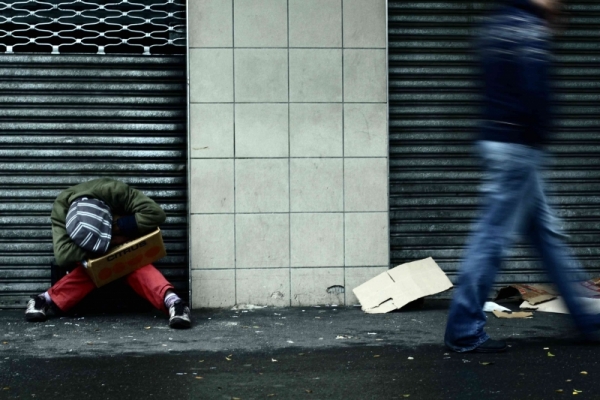We are wrong to celebrate CEOs for pretending to be poor for 12 hours

We’re a generation of clicktivists, incessantly raising awareness for a wide assortment of causes and social justice issues. But we rarely follow through with any tangible action or put our money where our ‘shares’ are. So, logically, we should be lauding those attempting to deliver actual change by attempting to physically address societal problems.
Take the #CEOSleepOutZA – an event that raised R25 million for Girls & Boys Town, a worthy cause that focuses on the needs of at risk youth in Johannesburg. Surely, the praise that the 250 captains of industry who participated in the event received is well-deserved? On a surface level, they addressed a real need, and tried to understand the experiences of others. Surely, an event of this nature is far better than a simple hashtag?
Simply put, no. While physical bodies (with open wallets) in spaces are important, events like #CEOSleepOut actually do more harm than good. And as civil society we need to be more critical, and pressure industry to do better.
Firstly, there’s something deeply hypocritical about CEOs at the very top end of a system that perpetuates massive inequality making a once off donation, while underpaying their employees.
One of the participating CEOs, Chris Griffiths of Anglo American Platinum, raised eyebrows earlier this year when his salary was increased by a full million to R18.5million at the very time his company was retrenching workers. Amplats continues to refuse to increase miners’ monthly salaries. To then claim concern for the wellbeing of the disadvantaged is hugely hypocritical.
Secondly, a once off donation, however welcome, is not sustainable. Wealth redistribution should come through wage reforms. The idea that a once off donation, however large, would radically change the inequality landscape is laughable, and harmful. It perpetuates the idea of shining saviours providing salvation to the less fortunate, instead of changing systemic, institutionalised inequality through job creation and fair pay packages.
It should also be noted that many of the registered captains of industry on the CEOSleepOut site have seemingly contributed nothing.
Yes, there is something to be said for the idea of walking in another’s shoes; perhaps the idea of the country’s 1% flocking to the streets to understand what it is like to be homeless is important. But does this justify the way CEOs appropriated and hijacked the lived experiences of homeless people last week? Had homeless people been consulted? Were they asked if this was offensive to them or if there was another way to raise money for their interests? Or do we not actually care about homeless people enough to ask?
It would be impossible to ‘simulate’ poverty via an organised event; there is no way a night or two on the streets would give anyone an understanding of what it’s like to live with no idea as to where your next meal is coming from, no health care, no sanitation, no clean clothes, constant fear of violence and the array of other concerns that living on the streets would entail. Claiming to understand such a lived experience after a one night foray into homelessness is offensive. At best, it may make a difference in personal worldview.
However, the CEOs didn’t even bother to try to understand the experience they were simulating. Their homelessness came complete with K-Way jackets, security guards, portable iPhone chargers, and portaloos in a cornered off part of Sandton. It was a mockery of the lives of millions of South Africans. Could they not last a night without the internet?
Nothing sustainable was achieved. The event did nothing to effectively change wealth distribution patterns in this country. It did not help participants to understand those less fortunate. It was just a fun urban camping adventure with fabulous networking opportunities. It has distracted us as a nation from focusing on those whose stories deserve to be told, those of actual homeless people.
Instead of hailing these CEOs as heroes, South Africans need to think deeper. South Africa’s CEOs should organize themselves to allocate their considerable profits to establishing private funds to contribute towards the lives of the country’s most vulnerable citizens, as well as engaging the public sector to generate genuinely pro-poor policies.
Natasha Skoryk is in her third year at the University of Cape Town and is currently serving as the Internal Deputy Chair of Ubunye. Caitlin Spring is completing her honours in Gender and Transformation at the University of Cape Town and is the Communications and Strategy Intern at a local NGO. The opinions expressed in this article are solely those of the authors. No inference should be made on whether these reflect the editorial position of GroundUp
Support independent journalism
Donate using Payfast

Don't miss out on the latest news
We respect your privacy, and promise we won't spam you.
Next: Tsunami residents demand new land
Previous: Joe Slovo residents queue for water

This article is licensed under a Creative Commons Attribution-NoDerivatives 4.0 International License.
